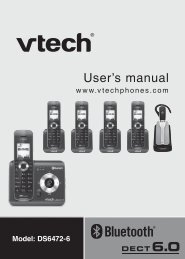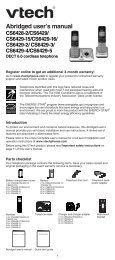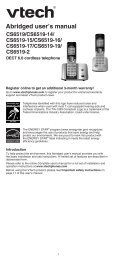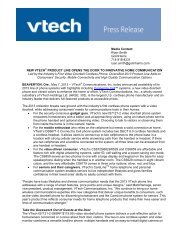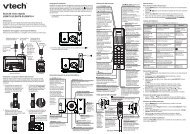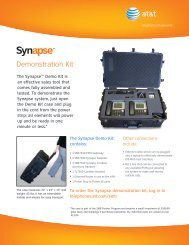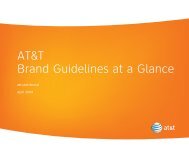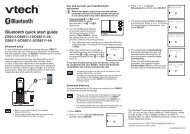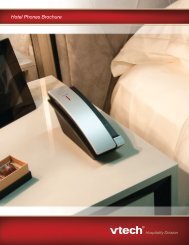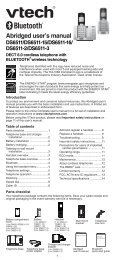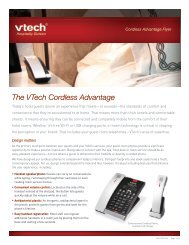caregiver and senior problem-solving ... - Att.vtp-media.com
caregiver and senior problem-solving ... - Att.vtp-media.com
caregiver and senior problem-solving ... - Att.vtp-media.com
You also want an ePaper? Increase the reach of your titles
YUMPU automatically turns print PDFs into web optimized ePapers that Google loves.
Media Contact:<br />
Ryan Smith<br />
GolinHarris<br />
(949) 689-3999<br />
ryan.smith@golinharris.<strong>com</strong><br />
CAREGIVER AND SENIOR PROBLEM-SOLVING OPPORTUNITIES REVEALED<br />
IN NEW VTECH COMMUNICATION SURVEY<br />
Caregivers Cite Desire to Help More <strong>and</strong> Address Communication<br />
Needs of Seniors Wanting to Age in Place<br />
BEAVERTON, Ore., January 8, 2013 – More than 60 percent of <strong>caregiver</strong>s spend at least nine<br />
hours with a <strong>senior</strong> a week, but both groups see ways to improve the time apart, according to a<br />
survey 1 exploring <strong>com</strong>munications challenges <strong>and</strong> perceptions in <strong>senior</strong>-<strong>caregiver</strong> relationships.<br />
The survey was conducted by VTech ® Communications, a wholly owned subsidiary of VTech<br />
Holdings Ltd. (HKSE: 303) <strong>and</strong> fielded by independent market research firm Toluna.<br />
The VTech Caregiver/Senior Communication Survey found that <strong>caregiver</strong>s worried most about<br />
the time <strong>senior</strong>s were alone, while <strong>senior</strong>s missed an active social life. Survey results were<br />
revealed in advance of Silvers Summit, a conference <strong>and</strong> exhibition on technology for <strong>senior</strong>s at<br />
the annual International CES in Las Vegas (VTech Booth #26921).<br />
The survey examined the issues <strong>caregiver</strong>s <strong>and</strong> <strong>senior</strong>s face in <strong>com</strong>municating as <strong>senior</strong>s strive<br />
to age independently. More than a third of <strong>caregiver</strong>s said their greatest concern is that they were<br />
not doing enough for the <strong>senior</strong>s in their lives. From the other perspective, 41 percent of <strong>senior</strong>s<br />
said their top challenge was not being as active or social as they would like. These top concerns<br />
overshadowed both groups’ worries about financial issues or other realities of aging <strong>and</strong><br />
caregiving.<br />
Another key finding of the survey was that nearly seven of 10 <strong>caregiver</strong>s said they experience<br />
challenges <strong>com</strong>municating with <strong>senior</strong>s under their care, citing physical limitations such as<br />
hearing <strong>problem</strong>s, illness or disabilities as top concerns. The majority (59.3 percent) of <strong>senior</strong>s,<br />
however, noted no <strong>com</strong>munication challenges -- of those that did, physical difficulties topped the<br />
list.<br />
"The VTech survey confirms that staying connected <strong>and</strong> sharing experiences are essentials of<br />
healthy aging <strong>and</strong> maintaining self-esteem," says Adriane Berg, international speaker <strong>and</strong> aging<br />
expert. "For <strong>caregiver</strong>s, ease of <strong>com</strong>munication with the <strong>senior</strong>s they love relieves stress,<br />
reduces guilt <strong>and</strong> builds rich relationships. Whether emotional, technical or financial, any barriers<br />
to <strong>com</strong>munication are detrimental to <strong>senior</strong>s <strong>and</strong> <strong>caregiver</strong>s, alike. Addressing barriers to<br />
connectivity adds to <strong>senior</strong> confidence <strong>and</strong> security, <strong>and</strong> promotes vital inter-generational<br />
exchange."<br />
The survey responses revealed a variety of <strong>com</strong>munications styles. More than a third of <strong>senior</strong>s<br />
<strong>and</strong> <strong>caregiver</strong>s have casual relationships <strong>and</strong> are <strong>com</strong>fortable chatting frequently. More<br />
<strong>caregiver</strong>s (20 percent) than <strong>senior</strong>s (9.3 percent) felt a strain in their <strong>com</strong>munication, <strong>and</strong> more<br />
<strong>senior</strong>s (36 percent) than <strong>caregiver</strong>s (19.4 percent) described their relationships as sharing every<br />
1
VTECH CAREGIVER/SENIOR COMMUNICATION SURVEY Page 2<br />
activity <strong>and</strong> update. While more than half of surveyed <strong>senior</strong>s don’t worry about being alone,<br />
almost all <strong>caregiver</strong>s surveyed (93.5 percent) identified at least one potential situation that<br />
worried them, such as a fall, injury or crisis.<br />
Staying Safe While Home Alone<br />
Many <strong>senior</strong>s experience long hours alone at home – 91.6 percent of <strong>senior</strong>s surveyed said they<br />
spend time alone during the week. Their top worries, along with their <strong>caregiver</strong>s’ concerns,<br />
included:<br />
Fall or injury (76.1 percent of <strong>caregiver</strong>s <strong>and</strong> 33 percent or <strong>senior</strong>s)<br />
Medical event or injury requiring im<strong>media</strong>te assistance (60.8 percent of <strong>caregiver</strong>s <strong>and</strong><br />
25.2 percent of <strong>senior</strong>s)<br />
Other general <strong>problem</strong>s that <strong>senior</strong>s wouldn’t feel equipped to deal with alone (45.9<br />
percent of <strong>caregiver</strong>s <strong>and</strong> 14 percent of <strong>senior</strong>s)<br />
Seniors <strong>and</strong> their <strong>caregiver</strong>s identified products they felt supported independent lifestyles, aging<br />
<strong>and</strong> peace of mind:<br />
Communication tools such as email, phones, cellphones <strong>and</strong> Skype – 41.7 percent<br />
total<br />
Healthcare technology such as blood pressure monitors <strong>and</strong> medication dispensers –<br />
36.7 percent total<br />
Personal safety products such as wearable pendants to call someone in case of an<br />
emergency <strong>and</strong> home alarm system – 29.4 percent<br />
VTech’s CareLine Personal Communications System Helps Fill Gaps<br />
Addressing <strong>caregiver</strong> needs to reach their loved ones, <strong>and</strong> <strong>senior</strong>s’ desire to remain connected<br />
<strong>and</strong> social, VTech’s new CareLine home safety telephone system supports independent living.<br />
Designed with experts in aging <strong>and</strong> technology, the three-piece CareLine SN6197 system<br />
(MSRP: $119.95), includes a full-featured corded phone, a cordless h<strong>and</strong>set <strong>and</strong> a wearable<br />
pendant. Blending the <strong>com</strong>fort <strong>and</strong> ease of a home phone with the security <strong>and</strong> flexibility of<br />
personal safety products, CareLine puts the ability to connect with trusted contacts at <strong>senior</strong>s’<br />
fingertips.<br />
VTech’s CareLine has no monthly fees, installation costs or contracts, making it an affordable<br />
alternative to personal emergency response systems (PERS). Designed to meet the daily<br />
<strong>com</strong>munication needs of <strong>senior</strong>s, the wearable pendant allows them to conveniently make <strong>and</strong><br />
receive calls, listen to voicemail messages, review missed calls or receive programmed<br />
reminders for medication, appointments or other events.<br />
“We recognized <strong>senior</strong>s <strong>and</strong> their <strong>caregiver</strong>s needed a tool to bridge the unique <strong>com</strong>munications<br />
needs <strong>and</strong> challenges that <strong>com</strong>e with aging,” said Matt Ramage, <strong>senior</strong> vice president of product<br />
management for VTech Communications. “Families can use features such as recorded reminders<br />
to help <strong>senior</strong>s manage their lives independently, <strong>and</strong> they can trust the wearable pendant for<br />
quick connection for im<strong>media</strong>te needs. In turn, <strong>senior</strong>s have the connectivity tools to help them<br />
stay independent.”<br />
For more information about the VTech Caregiver/Senior Communication Survey or VTech’s<br />
CareLine System, please visit www.vtechphones.<strong>com</strong>/careline.<br />
About VTech<br />
VTech is the world’s largest manufacturer of cordless telephones <strong>and</strong> electronic learning products.<br />
It also provides highly sought-after contract manufacturing services. Founded in 1976, the<br />
Group’s mission is to be the most cost effective designer <strong>and</strong> manufacturer of innovative, highquality<br />
consumer electronic products <strong>and</strong> to distribute them to markets worldwide in the most<br />
efficient manner.<br />
# # #
VTECH CAREGIVER/SENIOR COMMUNICATION SURVEY Page 3<br />
1. Toluna, Inc. fielded the study on behalf of VTech from 12/13/12 to 12/22/12 via its online omnibus service,<br />
interviewing a nationwide sample of 678 Americans aged 18 years <strong>and</strong> older, of which 464 were <strong>caregiver</strong>s <strong>and</strong> 214<br />
were <strong>senior</strong>s. Data was weighted using propensity score weighting to be representative of the total U.S. adult<br />
population on the basis of region, age within gender, education, household in<strong>com</strong>e, race/ethnicity, <strong>and</strong> propensity to<br />
be online. Data for questions related to online use or behaviors were weighted specifically to the respective “online”<br />
populations. No estimates of theoretical sampling error can be calculated; a full methodology is available.



